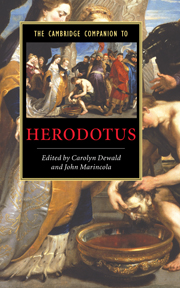Book contents
- Frontmatter
- Introduction
- 1 Herodotus and the poetry of the past
- 2 Herodotus and his prose predecessors
- 3 Herodotus and tragedy
- 4 The intellectual milieu of Herodotus
- 5 Meta-historiē: Method and genre in the Histories
- 6 The syntax of historiē: How Herodotus writes
- 7 Speech and narrative in the Histories
- 8 Herodotus, Sophocles and the woman who wanted her brother saved
- 9 Stories and storytelling in the Histories
- 10 Humour and danger in Herodotus
- 11 Location and dislocation in Herodotus
- 12 Herodotus and the natural world
- 13 Herodotus and Greek religion
- 14 Warfare in Herodotus
- 15 Herodotus, political history and political thought
- 16 Herodotus and the cities of mainland Greece
- 17 An alternate world: Herodotus and Italy
- 18 Herodotus and Persia
- 19 Herodotus and foreign lands
- 20 Herodotus' influence in antiquity
- Glossary
- Timeline
- Bibliography
- Index
- Series List
8 - Herodotus, Sophocles and the woman who wanted her brother saved
Published online by Cambridge University Press: 28 January 2007
- Frontmatter
- Introduction
- 1 Herodotus and the poetry of the past
- 2 Herodotus and his prose predecessors
- 3 Herodotus and tragedy
- 4 The intellectual milieu of Herodotus
- 5 Meta-historiē: Method and genre in the Histories
- 6 The syntax of historiē: How Herodotus writes
- 7 Speech and narrative in the Histories
- 8 Herodotus, Sophocles and the woman who wanted her brother saved
- 9 Stories and storytelling in the Histories
- 10 Humour and danger in Herodotus
- 11 Location and dislocation in Herodotus
- 12 Herodotus and the natural world
- 13 Herodotus and Greek religion
- 14 Warfare in Herodotus
- 15 Herodotus, political history and political thought
- 16 Herodotus and the cities of mainland Greece
- 17 An alternate world: Herodotus and Italy
- 18 Herodotus and Persia
- 19 Herodotus and foreign lands
- 20 Herodotus' influence in antiquity
- Glossary
- Timeline
- Bibliography
- Index
- Series List
Summary
Many different kinds of thematic resonance come into play in the story that both Herodotus and Sophocles use about the woman who wanted to save a brother rather than her husband or son (3.119). Our argument starts with the observation that one of the most important of these resonances, both to Herodotus the historian and to Sophocles the dramatist, lies in the realm of metanarrative. Both Herodotus and Sophocles are skilled in the artful use of logos themselves, and they use the story of the woman who wanted her brother saved as a logos about the power of logos, reflecting on some of the complexities of speech as an act of communication.
A logos in Greek can be a word, a story, or an argument; the logos or story we have chosen to focus on here is both an anecdote and an argument shared by Herodotus and Sophocles. It seems quite possible that the logos of the woman who chose to save her brother rather than a husband or son was brought into play by both Herodotus and Sophocles to depict the tendency of logos itself to be manipulated in unusual ways by unusual people, but also to lead to results that subvert the speakers' initial expectations. Herodotus and Sophocles work in different genres, and exploit the possibilities of the anecdote quite differently, but in their different uses of the story, each of them reflects ironically on some of the ambiguities inherent in the intellectual turmoil prevalent in mid-fifth-century Greece about the nature and power of language.
- Type
- Chapter
- Information
- The Cambridge Companion to Herodotus , pp. 122 - 129Publisher: Cambridge University PressPrint publication year: 2006

